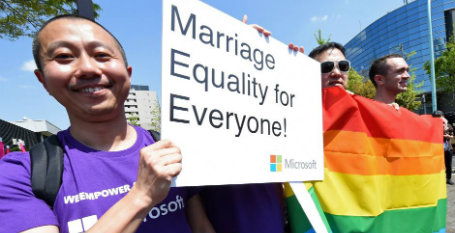The LGBT community is urging lawmakers to legalise same-sex marriages.
About 3,000 people, from the lesbian, gay, bisexual and transgender community, took part in the parade through the national capital’s entertainment and shopping district of Shibuya.
The district only recently was in the news for passing a resolution to issue “partnership” certificates to gay couples. This act is not legally binding as the Japanese Constitution recognizes only marriages between two sexes but it nonetheless remains the first to recognize same-sex unions in Japan.
Participants at the gay pride parade waved rainbow-colored flags and banners calling for marriage equality rights, media reported.
“We simply want to be with a loved one,” said Fumino Sugiyama, 33, one of the parade organisers, was quoted by AFP as saying. “But (the law) denies our idea. We are frustrated and don’t know what to do.”
A lack of legal recognition means that gay couples are often prevented from visiting their partners in hospitals or refused a tenancy or inheritance rights afforded to others.
Japan has national holidays in late April and early May and is known as Golden Week. The LGBT makes use of this by festooning some streets in Tokyo with rainbow-colored flags and organizing events to promote equality for lesbians, gays, bisexuals and transgender people.
This year’s Gay Parade saw the absence of Akie Abe, wife of the Japanese prime minister, who last year not only took part in the annual Tokyo gay parade but went on to write about equality and anti-gay discrimination on her Facebook page.
“I want to help build a society where anyone can conduct happy, enriched lives without facing discrimination,” wrote the 51-year-old wife of Japanese Prime Minister Shinzo Abe on her Facebook page last year.
Akie Abe is currently in the United States on a state visit with her husband.
Same-sex relations were legalized way back in 1880 in Japan and although Japanese culture does not have a history of hostility toward LGBT people, they nonetheless lack legal recognition and are often subjected to social discrimination.

